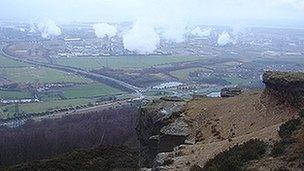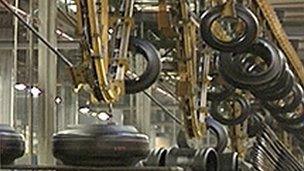Can Regional Growth Fund wins transform north economy?
- Published
- comments

The chemical industry in Teesside was one of the winners in the latest round of the Regional Growth Fund
The North East and Cumbria scored some big successes in the latest round of grants from the government's Regional Growth Fund, external.
More than 50 of the 119 successful bids came from the region.
In the North East alone, the money will help create or safeguard 8,500 jobs directly, and another 17,000 in the supply chain.
Winning bids
After missing out in the first round, Cumbria scored three successes, external.
Pirelli in Carlisle will get money towards developing low carbon methods of producing tyres, Gilkes of Kendal will get £2.75m towards the costs of rebuilding and refurbishing its factory, and West Cumbria's Energy Coast also put in a winning bid.
On the face of it then the government has delivered what it first promised from the fund.
Money has been targeted at regions like the North East and Cumbria which have been heavily dependent on public sector jobs.
There are some odd quirks though.
The South East and East of England only had nine successful bids, but the government estimates those will actually create or secure around 30,000 jobs - more than on offer in the 50 projects approved in the North East.

The Pirelli tyre factory in Carlisle was one of the companies which got money from the Regional Growth Fund
Presumably that's because some of the projects were bigger, but in any case whichever way you look at it, for the companies winning cash in the north, it is great news.
But what impact can the grants really have on the regional economy?
Last month alone saw unemployment in the North East rise by 19,000.
So although 25,000 jobs is a significant number, it might not be enough to arrest the rise in the dole queue.
Flourishing economy
The government says other policies will help, such as cuts in corporation tax and the creation of two enterprise zones in the North East.
Fundamentally it believes it can create the economic conditions necessary to help the private sector flourish.
But there is a time lag to all these policies.
The awards from the first round of the Regional Growth Fund, external were announced in the spring, but are only just starting to be paid.
It's estimated that money from the second round won't start flowing until next spring.
In the meantime, more public sector jobs are going.
Around 16,000 of them have been lost, external in the North East in the last 12 months, with some collateral damage in the private sector too.
International economic conditions are also making life difficult.
Funding exhausted
And now the money from the Regional Growth Fund has been exhausted, there is no sign that more resources will be found for a third round.
It was always the government's intention to limit the lifespan of the fund.
But when it decided to place that time limit, it was predicting growth figures which are so far proving difficult to deliver.

Newcastle University successfully bid for funds to help deliver its Science City development
The crisis in the Euro zone was also just a little local difficulty in Greece at the time.
The question is where will companies turn in the future, particularly if banks remain unwilling to hand out loans?
The second round of the fund was massively oversubscribed, external, with more than £2bn of projects missing out.
In the North East, around 80 bids failed to get funding.
Even if you accept that some of those were duffers, or could happen in other ways, that's an awful lot of potentially job-creating projects that have now bitten the dust.
In any case Labour says the finance on offer, external from the fund was only a third of what it used to spend on Regional Development Agencies.
But of course, money is no longer as plentiful.
And although Labour has some ideas on how to boost the economy - VAT cuts being the prime one - they have not formally recommitted to reintroducing development agencies and their multi-million pound pots of money.
We are then firmly in the hands of the private sector to see if it can create new jobs without a government pot of gold to help it out.